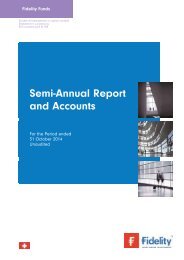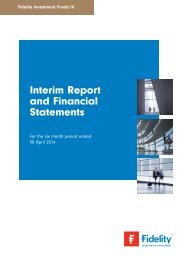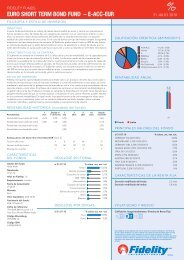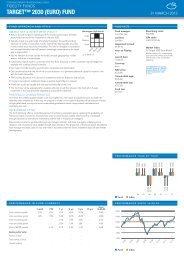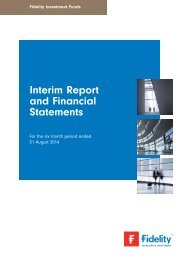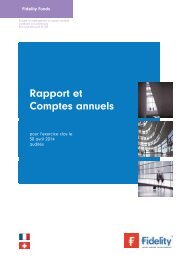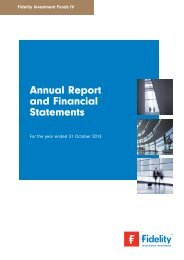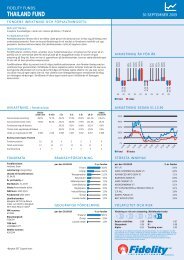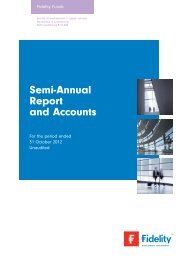- Page 1 and 2: Fidelity Funds Société d’invest
- Page 3 and 4: Fidelity Funds Contents Introductio
- Page 5: Fidelity Funds Directors and Superv
- Page 9 and 10: Fidelity Funds America Fund Schedu
- Page 11 and 12: Fidelity Funds American Diversified
- Page 13 and 14: Fidelity Funds American Growth Fund
- Page 15 and 16: Fidelity Funds Asia Pacific Dividen
- Page 17 and 18: Fidelity Funds Asia Pacific Propert
- Page 19 and 20: Fidelity Funds Asian Equity Fund 1,
- Page 21 and 22: Fidelity Funds Asian Smaller Compan
- Page 23 and 24: Fidelity Funds Asian Special Situat
- Page 25 and 26: Fidelity Funds China Consumer Fund
- Page 27 and 28: Fidelity Funds China Focus Fund Sc
- Page 29 and 30: Fidelity Funds Emerging Asia Fund
- Page 31 and 32: Fidelity Funds Emerging Markets Foc
- Page 33 and 34: Fidelity Funds Emerging Markets Fun
- Page 35 and 36: Fidelity Funds EURO STOXX 50 Fund 2
- Page 37 and 38: Fidelity Funds European Dividend Fu
- Page 39 and 40: Fidelity Funds European Dynamic Gro
- Page 41 and 42: Fidelity Funds European Growth Fund
- Page 43 and 44: Fidelity Funds European Smaller Com
- Page 45 and 46: Fidelity Funds European Smaller Com
- Page 47 and 48: Fidelity Funds France Fund Schedul
- Page 49 and 50: Fidelity Funds Global Consumer Indu
- Page 51 and 52: Fidelity Funds Global Dividend Fund
- Page 53 and 54: Fidelity Funds Global Equity Income
- Page 55 and 56: Fidelity Funds Global Focus Fund S
- Page 57 and 58:
Fidelity Funds Global Industrials F
- Page 59 and 60:
Fidelity Funds Global Property Fund
- Page 61 and 62:
Fidelity Funds Global Real Asset Se
- Page 63 and 64:
Fidelity Funds Global Telecommunica
- Page 65 and 66:
Fidelity Funds Greater China Fund -
- Page 67 and 68:
Fidelity Funds Greater China Fund I
- Page 69 and 70:
Fidelity Funds India Focus Fund 7
- Page 71 and 72:
Fidelity Funds International Fund
- Page 73 and 74:
Fidelity Funds International Fund -
- Page 75 and 76:
Fidelity Funds International Fund -
- Page 77 and 78:
Fidelity Funds International Fund -
- Page 79 and 80:
Fidelity Funds Japan Advantage Fund
- Page 81 and 82:
Fidelity Funds Japan Fund Schedule
- Page 83 and 84:
Fidelity Funds Japan Smaller Compan
- Page 85 and 86:
Fidelity Funds Latin America Fund
- Page 87 and 88:
Fidelity Funds Nordic Fund Schedul
- Page 89 and 90:
Fidelity Funds Pacific Fund - conti
- Page 91 and 92:
Fidelity Funds South East Asia Fund
- Page 93 and 94:
Fidelity Funds Switzerland Fund Sc
- Page 95 and 96:
Fidelity Funds Thailand Fund Sched
- Page 97 and 98:
Fidelity Funds World Fund Schedule
- Page 99 and 100:
Fidelity Funds Fidelity Patrimoine
- Page 101 and 102:
Fidelity Funds Fidelity Patrimoine
- Page 103 and 104:
Fidelity Funds Fidelity Patrimoine
- Page 105 and 106:
Fidelity Funds Fidelity Patrimoine
- Page 107 and 108:
Fidelity Funds Fidelity Patrimoine
- Page 109 and 110:
Fidelity Funds Fidelity Sélection
- Page 111 and 112:
Fidelity Funds Fidelity Sélection
- Page 113 and 114:
Fidelity Funds Fidelity Sélection
- Page 115 and 116:
Fidelity Funds Fidelity Sélection
- Page 117 and 118:
Fidelity Funds Fidelity Sélection
- Page 119 and 120:
Fidelity Funds FPS Global Growth Fu
- Page 121 and 122:
Fidelity Funds FPS Global Growth Fu
- Page 123 and 124:
Fidelity Funds FPS Global Growth Fu
- Page 125 and 126:
Fidelity Funds FPS Growth Fund 4 S
- Page 127 and 128:
Fidelity Funds FPS Growth Fund 4 -
- Page 129 and 130:
Fidelity Funds FPS Growth Fund 4 -
- Page 131 and 132:
Fidelity Funds FPS Moderate Growth
- Page 133 and 134:
Fidelity Funds FPS Moderate Growth
- Page 135 and 136:
Fidelity Funds FPS Moderate Growth
- Page 137 and 138:
Fidelity Funds Euro Balanced Fund
- Page 139 and 140:
Fidelity Funds Global Multi Asset I
- Page 141 and 142:
Fidelity Funds Global Multi Asset I
- Page 143 and 144:
Fidelity Funds Global Multi Asset I
- Page 145 and 146:
Fidelity Funds Global Multi Asset I
- Page 147 and 148:
Fidelity Funds Global Multi Asset I
- Page 149 and 150:
Fidelity Funds Global Multi Asset I
- Page 151 and 152:
Fidelity Funds Global Multi Asset I
- Page 153 and 154:
Fidelity Funds Growth & Income Fund
- Page 155 and 156:
Fidelity Funds Growth & Income Fund
- Page 157 and 158:
Fidelity Funds Growth & Income Fund
- Page 159 and 160:
Fidelity Funds Growth & Income Fund
- Page 161 and 162:
Fidelity Funds Multi Asset Strategi
- Page 163 and 164:
Fidelity Funds Multi Asset Strategi
- Page 165 and 166:
Fidelity Funds Multi Asset Strategi
- Page 167 and 168:
Fidelity Funds Multi Asset Strategi
- Page 169 and 170:
Fidelity Funds Multi Asset Strategi
- Page 171 and 172:
Fidelity Funds Multi Asset Strategi
- Page 173 and 174:
Fidelity Funds Multi Asset Strategi
- Page 175 and 176:
Fidelity Funds Multi Asset Strategi
- Page 177 and 178:
Fidelity Funds Asian Bond Fund - co
- Page 179 and 180:
Fidelity Funds Asian High Yield Fun
- Page 181 and 182:
Fidelity Funds China RMB Bond Fund
- Page 183 and 184:
Fidelity Funds Core Euro Bond Fund
- Page 185 and 186:
Fidelity Funds Emerging Market Corp
- Page 187 and 188:
Fidelity Funds Emerging Market Debt
- Page 189 and 190:
Fidelity Funds Emerging Market Loca
- Page 191 and 192:
Fidelity Funds Emerging Markets Inf
- Page 193 and 194:
Fidelity Funds Euro Bond Fund - con
- Page 195 and 196:
Fidelity Funds Euro Corporate Bond
- Page 197 and 198:
Fidelity Funds European High Yield
- Page 199 and 200:
Fidelity Funds European High Yield
- Page 201 and 202:
Fidelity Funds Global Corporate Bon
- Page 203 and 204:
Fidelity Funds Global Corporate Bon
- Page 205 and 206:
Fidelity Funds Global High Yield Fu
- Page 207 and 208:
Fidelity Funds Global High Yield Fu
- Page 209 and 210:
Fidelity Funds Global Income Fund -
- Page 211 and 212:
Fidelity Funds Global Income Fund -
- Page 213 and 214:
Fidelity Funds Global Inflation-lin
- Page 215 and 216:
Fidelity Funds Global Strategic Bon
- Page 217 and 218:
Fidelity Funds Global Strategic Bon
- Page 219 and 220:
Fidelity Funds Global Strategic Bon
- Page 221 and 222:
Fidelity Funds Global Strategic Bon
- Page 223 and 224:
Fidelity Funds Global Strategic Bon
- Page 225 and 226:
Fidelity Funds International Bond F
- Page 227 and 228:
Fidelity Funds Sterling Bond Fund
- Page 229 and 230:
Fidelity Funds US Dollar Bond Fund
- Page 231 and 232:
Fidelity Funds US High Yield Fund
- Page 233 and 234:
Fidelity Funds US High Yield Fund -
- Page 235 and 236:
Fidelity Funds Fixed Term 2018 Fund
- Page 237 and 238:
Fidelity Funds Euro Cash Fund Sche
- Page 239 and 240:
Fidelity Funds MoneyBuilder Europe
- Page 241 and 242:
Fidelity Funds MoneyBuilder Europe
- Page 243 and 244:
Fidelity Funds MoneyBuilder Europea
- Page 245 and 246:
Fidelity Funds MoneyBuilder Europea
- Page 247 and 248:
Fidelity Funds MoneyBuilder Global
- Page 249 and 250:
Fidelity Funds MoneyBuilder Global
- Page 251 and 252:
Fidelity Funds MoneyBuilder Global
- Page 253 and 254:
Fidelity Funds MoneyBuilder Global
- Page 255 and 256:
Fidelity Funds Fidelity Target 2020
- Page 257 and 258:
Fidelity Funds Fidelity Target 2020
- Page 259 and 260:
Fidelity Funds Fidelity Target 2020
- Page 261 and 262:
Fidelity Funds Fidelity Target 2020
- Page 263 and 264:
Fidelity Funds Fidelity Target 2020
- Page 265 and 266:
Fidelity Funds Fidelity Target 2020
- Page 267 and 268:
Fidelity Funds Fidelity Target 2015
- Page 269 and 270:
Fidelity Funds Fidelity Target 2015
- Page 271 and 272:
Fidelity Funds Fidelity Target 2015
- Page 273 and 274:
Fidelity Funds Fidelity Target 2020
- Page 275 and 276:
Fidelity Funds Fidelity Target 2020
- Page 277 and 278:
Fidelity Funds Fidelity Target 2020
- Page 279 and 280:
Fidelity Funds Fidelity Target 2020
- Page 281 and 282:
Fidelity Funds Fidelity Target 2025
- Page 283 and 284:
Fidelity Funds Fidelity Target 2025
- Page 285 and 286:
Fidelity Funds Fidelity Target 2025
- Page 287 and 288:
Fidelity Funds Fidelity Target 2025
- Page 289 and 290:
Fidelity Funds Fidelity Target 2025
- Page 291 and 292:
Fidelity Funds Fidelity Target 2030
- Page 293 and 294:
Fidelity Funds Fidelity Target 2030
- Page 295 and 296:
Fidelity Funds Fidelity Target 2030
- Page 297 and 298:
Fidelity Funds Fidelity Target 2030
- Page 299 and 300:
Fidelity Funds Fidelity Target 2035
- Page 301 and 302:
Fidelity Funds Fidelity Target 2035
- Page 303 and 304:
Fidelity Funds Fidelity Target 2035
- Page 305 and 306:
Fidelity Funds Fidelity Target 2040
- Page 307 and 308:
Fidelity Funds Fidelity Target 2040
- Page 309 and 310:
Fidelity Funds Fidelity Target 2040
- Page 311 and 312:
Fidelity Funds Fidelity Target 2045
- Page 313 and 314:
Fidelity Funds Fidelity Target 2045
- Page 315 and 316:
Fidelity Funds Fidelity Target 2045
- Page 317 and 318:
Fidelity Funds Fidelity Target 2050
- Page 319 and 320:
Fidelity Funds Fidelity Target 2050
- Page 321 and 322:
Fidelity Funds FAWF Asian Special S
- Page 323 and 324:
Fidelity Funds FAWF Diversified Sto
- Page 325 and 326:
Fidelity Funds FAWF Emerging Market
- Page 327 and 328:
Fidelity Funds FAWF Equity Income F
- Page 329 and 330:
Fidelity Funds FAWF International F
- Page 331 and 332:
Fidelity Funds FAWF International F
- Page 333 and 334:
Fidelity Funds FAWF International F
- Page 335 and 336:
Fidelity Funds FAWF International F
- Page 337 and 338:
Fidelity Funds FAWF Pacific Fund 1,
- Page 339 and 340:
Fidelity Funds FAWF Limited Term Bo
- Page 341 and 342:
Fidelity Funds FAWF Limited Term Bo
- Page 343 and 344:
Fidelity Funds FAWF US Dollar Bond
- Page 345 and 346:
Fidelity Funds FAWF US High Income
- Page 347 and 348:
Fidelity Funds FAWF US High Income
- Page 349 and 350:
Fidelity Funds Institutional Americ
- Page 351 and 352:
Fidelity Funds Institutional Asia P
- Page 353 and 354:
Fidelity Funds Institutional Euro B
- Page 355 and 356:
Fidelity Funds Institutional Europe
- Page 357 and 358:
Fidelity Funds Institutional Global
- Page 359 and 360:
Fidelity Funds Institutional Global
- Page 361 and 362:
Fidelity Funds Institutional Japan
- Page 363 and 364:
Fidelity Funds Institutional Europe
- Page 365 and 366:
This page has been left blank inten
- Page 367 and 368:
Asia Pacific Dividend Fund Asia Pac
- Page 369 and 370:
Emerging Markets Fund Euro Blue Chi
- Page 371 and 372:
Global Consumer Industries Fund Glo
- Page 373 and 374:
Greater China Fund Greater China Fu
- Page 375 and 376:
Malaysia Fund Nordic Fund Pacific F
- Page 377 and 378:
Balanced Funds: FPS Global Growth F
- Page 379 and 380:
Emerging Market Debt Fund Emerging
- Page 381 and 382:
International Bond Fund Sterling Bo
- Page 383 and 384:
Reserved Equity Funds: Fidelity Tar
- Page 385 and 386:
Reserved Bond Funds: Institutional
- Page 387 and 388:
Institutional Global Sector Fund 4,
- Page 389 and 390:
Fidelity Funds Statement of Net Ass
- Page 391 and 392:
Fidelity Funds Statement of Net Ass
- Page 393 and 394:
Fidelity Funds Statement of Net Ass
- Page 395 and 396:
Fidelity Funds Statement of Net Ass
- Page 397 and 398:
Fidelity Funds Statement of Net Ass
- Page 399 and 400:
Fidelity Funds Statement of Net Ass
- Page 401 and 402:
Fidelity Funds Statement of Net Ass
- Page 403 and 404:
Fidelity Funds Statement of Net Ass
- Page 405 and 406:
Fidelity Funds Statement of Net Ass
- Page 407 and 408:
1 Fidelity Funds Notes to the Finan
- Page 409 and 410:
Fidelity Funds Notes to the Financi
- Page 411 and 412:
Fidelity Funds Notes to the Financi
- Page 413 and 414:
Fidelity Funds Notes to the Financi
- Page 415 and 416:
Fidelity Funds Notes to the Financi
- Page 417 and 418:
Fidelity Funds Notes to the Financi
- Page 419 and 420:
Fidelity Funds Notes to the Financi
- Page 421:
Fidelity, Fidelity Worldwide Invest



